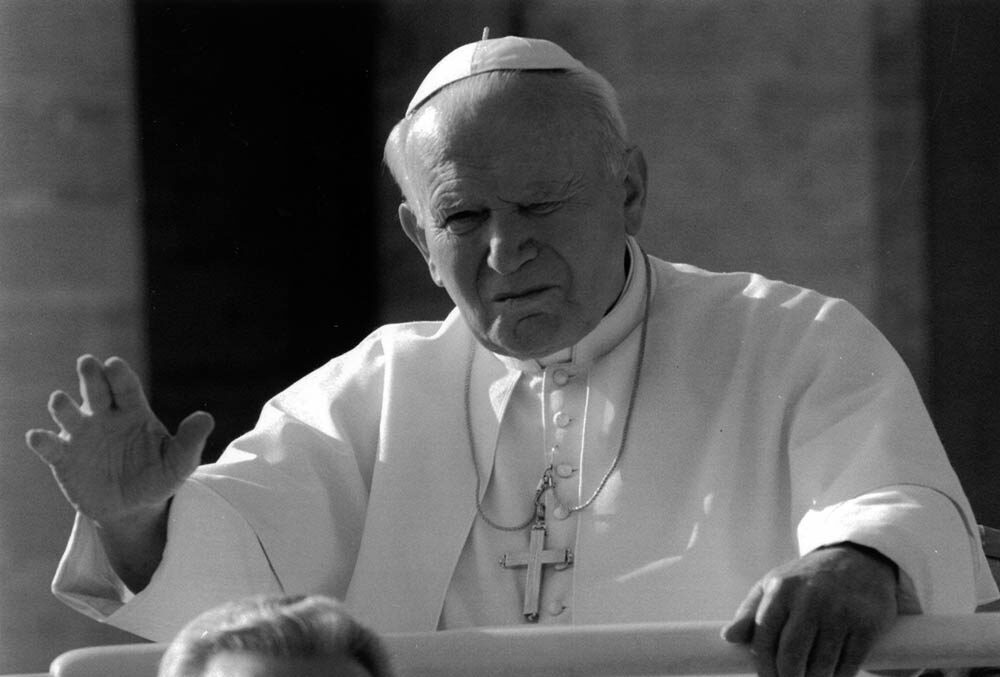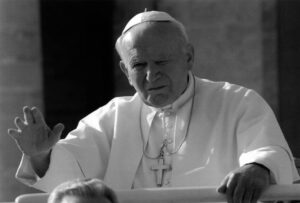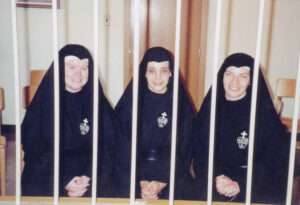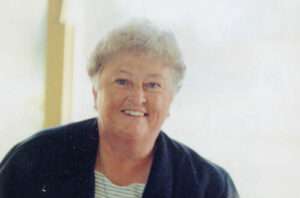
Note: The pictures for this story are copyrighted and not available for web publication.
TORONTO – Three days after Pope John Paul threatened to punish those who dissent from official church teachings, an order of North American nuns openly urged each other to support women’s ordination even if it means being kicked out of the Roman Catholic Church.
“We can’t allow to have ourselves silenced,” said sister Jane McDonnell, general leader of the Institute of the Blessed Virgin Mary, also known as the Loretto Sisters. “This is a moment of decision for those who have been waffling. This is an epiphany. We have to speak out. And I know that means we’re going to enter into a martyrdom.”
Known as one of the most liberal Catholic orders, the Loretto Sisters met here this summer to celebrate the group’s 150 years on this continent and to discuss what causes they would support. About 350 nuns, affiliates and friends spent the two days listening to two feminists: one an American professor of Catholicism and the other a Canadian political activist.
The conference opened with Sister Miriam Therese Winters, a professor of religion and feminist studies at the Hartford Seminary in Connecticut and a member of the Medical Mission Sisters. “I’m pushing for more women to be ordained,” she told the audience. “We need to raise awareness that certain people don’t have all the truth or all the answers.”
A week before the conference, the pope called for “just punishment” for those who openly disagree on such issues as euthanasia, premarital sex and the ordination of women to the Catholic priesthood. The punishment could range from a warning to excommunication.
Winters said the new rule is unenforceable because so many disagree with the church’s refusal to ordain women. The majority of American Catholics have supported women’s ordination, according to national polls taken over the past 30 years.
In a talk that encouraged the women to call God “Sofia,” Winters urged the sisters to “stand together so as not to be eliminated one by one.” She said women’s ordination is a small part of what feminists in the church are asking from church officials. It’s not just about being in decision-making positions, she said, but also about a chance to bring a female perspective that is concerned with justice for the poor and the oppressed.
“I know the pope is an intelligent man, so why would he keep alienating people like this?” asked Sister Judy Kidd, a 62-year-old retired Catholic schoolteacher who lives in Toronto.
Some sisters said the ruling could unite people, even those who aren’t in favor of women priests, on the ground that the pope is trying to suppress a sacred belief to many Americans and Canadians: freedom of thought and speech.
Sister Eleanor Holland, an administrator at the Catholic Theological Union in Chicago and the order’s former general leader, said the pope’s proclamation will have a chilling effect on Catholics.
“For several years, I’ve stopped reading papal documents,” said Sister Caroline Dawson, one of the top five leaders of the order. “To me, they’re irrelevant and painful. I know people see this as a white, North American women’s issue. They tell us we’re overeducated. It takes courage if you’re going to be a woman of integrity, justice and freedom in this church.”
At the conference, the women were encouraged to brainstorm together what each could do to show support for women’s equality in the church. “I say we all go on strike and see what happens in the schools and the parishes,” said Sister Josepha Brown, of Toronto.
The Loretto Sisters needn’t look far for inspiration. Their order’s founder, Englishwoman Mary Ward, was thrown in prison and excommunicated in the 17th century because the bishops found her ideas regarding women “heretical.” She was called “a noxious weed” and “a rebel to the Holy Mother.” Ward said that women could do as much as men, that religious women shouldn’t be closed up in convents and should be able to rule themselves, as opposed to being ruled by the church’s bishops. All those ideas were against church rules at the time.
With branches in Ireland and Europe, the sisters established the North American branch in Toronto in 1847 to educate the children of Irish immigrants. Over the years, they have moved into more diverse ministries that include justice for women and children, women’s equality, feminist spirituality, and ecology. The North American branch has more than 100 affiliates and about 240 sisters in the United States, Canada, Bolivia, South Africa, and the West Indies.
“We take risks, in our better moments,” said general leader McDonell. “We speak out when we see an injustice and definitely when it involves women and equality and women in the church.”
McDonell and other Loretto Sisters don’t fear reprisals by the Vatican, because they said the pope has been trying for years to stifle those who speak out on what the Vatican considers liberal issues. The women said that each time the Vatican makes a statement on women’s ordination and calls its ruling “definitive,” another proclamation always follows.
©1998 Cheryl Reed
Cheryl Reed is a freelance writer based in Minneapolis who is studying contemporary issues in the Catholic Church. A version of this piece also appeared in the Minneapolis Star-Tribune.




